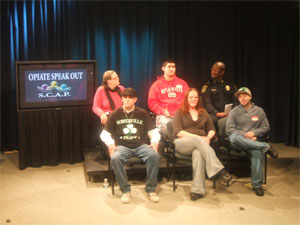
|
Police
Chief Tony Holloway along with four young recovering adults share
information at the Sixth Annual Opiate Speak Out presented by SCAP.
~Photo courtesy of SCAT TV |
|
By Vladimir Lewis
Four
Somerville young adults recovering from drug and alcohol abuse shared
their experience ,strength, and hope in a televised community forum
Wednesday night, April 1st. Police Chief Tony Holloway was also present
and he shared information about controversial Question 2. The Sixth
Annual Opiate Speak Out was presented by SCAP, Somerville Cares About
Prevention, and produced at Somerville Community Access Television in
Union Square.
The group shared their stories of the progression
of their disease from a seemingly harmless pastime that helped them
"fit in, have fun, and be cool" to each individual's nightmare. They
all expressed gratitude of being able to clean up and wanted to give
back to other addicts still out there suffering.
"It is
unfortunate for the people I know who are doing life bids (prison
terms) for doing things they wouldn't do if they weren't under the
influence," said Danielle Rogovich, 23. "It starts off very calm.
You're just having fun, hanging with your friends. It was something to
fit in. It starts out with one joint (marijuana cigarette) and it went
on from there."
Mark McLaughlin, 23, from Save Our Somerville,
said he wants to help. He's seen a lot of people die. By the time he
started high school in 2000, he said 16 local youths had already died
due to drugs and related suicides.
"If someone can get clean
because of a death, then we can say they didn't really die in
vain…their death can have a meaning," McLaughlin said.
The panel discussion was led by Nancy Bacci, Youth Programming Coordinator for the City of Somerville.
Mayor
Curtatone spoke before the discussion expressing his concern.
"Substance abuse is a community issue that needs a community response,"
he said.
Chief Holloway shared important facts about Question 2.
"There's a lot of misinformation about Question 2 out there…if
someone is caught with under an ounce, you'll get a civil penalty of
100 dollars…and as of January 1 this year, this will not show on
someone's CORI…but you can be charged with distributing if you have
under an ounce and it's packaged for sale, and you can be charged and
detained if you're operating a motor vehicle under the influence (of
marijuana)," he said.
Holloway said for people under 18 they
must pay a 100 dollar fine and complete a required education program.
If someone doesn't complete the program, they can be fined 1,000
dollars.
"We don't interpret the law. We just enforce it," he said.
Mitchell
Tutein, 23, has lived his whole life in Somerville. He started out at
age 13 hanging out with the older kids smoking pot and drinking. This
led him to "ecstasy," acid and cocaine.
I went from a simple
joint to jail – I thought I could handle things. I could not. It took
me 10 years to realize this," he said. Tutein said he had lost 4
friends to drugs by age 19, and 8 of his friends had died by the time
he was 21.
Tutein's been clean about six months. The time when
he was doing his first "bid" was the first time he'd been clean in ten
years. "While I was locked up (for 45 days) this made me think about
all the people I had hurt – my parents, people I robbed – and I was
looking at Billerica (prison) time. When I was using my future didn't
cross my mind once. When I was high I thought I was unstoppable, but I
wasn't – it was embarrassing. I felt like an idiot. I was in the paper
in Somerville and Medford."
Charlie Litopoulos, 23 , started at
age 12 with alcohol and "weed." "I always wanted to fit in," he said.
These gateway drugs led to klonopin, ecstasy, vicodin and cocaine. Then
his habit progressed to oxycontin and heroin. "All the dead ends of my
life were due to (starting with) alcohol…my drugs were more important
to me than anything. I do regret, now, who I hurt, but at the time I
didn't care. I didn't have arrests, so I thought I was on top of the
world, but the arrests came…I had to go through a lot of pain to get
to where I am now in my life."
An audience member asked if it
was hard to get a job with a criminal record. The group agreed things
could be tough, but there are community members out there willing to
help. "I understand (about jobs), but I've found people out there
willing to help. There are ways around things," Litopoulos said.
For
a strong recovery, the four stressed staying positive, going to
meetings, going to therapy, asking for help, being honest with
themselves and others, staying with clean and sober people, staying
away from old using people and places and remembering the pain when
they hit their bottoms. They all expressed gratitude for being in
recovery and a desire to give back by helping others.
A video
was shown depicting a teenage kid being pressured by his peers into
smoking marijuana with them. They all seem to think it's harmless fun.
Later in the video the boy is happy about being hired for a job. But
he's required to take a drug test. The next day he is humiliated when
he's told he won't be hired because he failed the drug test. "Weed is a
gateway drug. That's how it all started for most of us," said Rogovich.
An audience member asked if they thought the new marijuana laws would encourage people to smoke the drug.
Tutein
said he was in jail when it was voted on, but he would not have voted
for it. He said he would never had gotten clean if he hadn't been put
in jail.
Chief Holloway complemented Tutein, "The 'expert' is absolutely correct. I agree with this young man here. I voted 'no' on it."
Tutein said, "Stay clean, stay strong, it's hard, but don't give up."
|
















Reader Comments